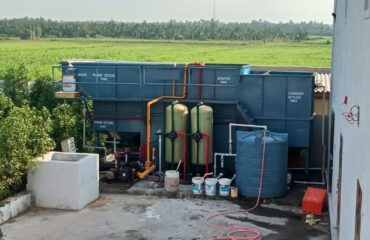In the evolving landscape of industrialization and urban growth, the effective management of wastewater has become a paramount concern. Effluent Treatment Plants (ETPs) play a pivotal role in addressing this challenge, particularly in regions experiencing rapid development like Katihar. This article explores the significance of Effluent Treatment Plants in Katihar’s journey towards sustainable wastewater management, highlighting their role in environmental preservation and the innovative contributions of industry leaders.
Understanding Effluent Treatment
Effluent treatment is the process of treating and purifying wastewater generated by industrial processes, commercial activities, and households. This wastewater often contains pollutants and contaminants that can harm the environment and human health if not properly treated. Effluent Treatment Plants are designed to remove or neutralize these pollutants, ensuring that the treated water meets stringent quality standards before being released or reused.
The Role of Effluent Treatment Plants
Effluent Treatment Plants serve as crucial guardians of the environment, preventing the release of harmful substances into natural water bodies. By treating wastewater before its discharge, these plants play a pivotal role in preserving aquatic ecosystems, safeguarding public health, and promoting overall ecological balance. In regions like Katihar, where industrial growth is on the rise, the presence of effective ETPs is indispensable to prevent pollution and ensure sustainable development.
Challenges in Wastewater Management
As Katihar undergoes rapid industrial and urban expansion, the volume of wastewater generated has increased significantly. This surge in wastewater poses multifaceted challenges, including:
Environmental Impact
Improperly treated wastewater can lead to pollution of rivers, lakes, and groundwater, affecting aquatic life and the well-being of communities that depend on these water sources.
Regulatory Compliance
Strict environmental regulations require industries to adhere to specific standards for wastewater discharge. Non-compliance can lead to legal consequences, fines, and reputational damage.
Addressing Challenges with Effluent Treatment Plants
Environmental Conservation
The establishment of Effluent Treatment Plants in Katihar is vital to conserve the region’s natural environment. These plants ensure that pollutants are effectively removed from wastewater before it is released into water bodies, thus preventing contamination and preserving biodiversity.
Sustainable Growth
Effluent Treatment Plants play a pivotal role in supporting Katihar’s sustainable growth. By enabling industries to manage their wastewater responsibly, these plants allow for economic development while minimizing environmental impact.
Innovative Solutions by Industry Leaders
Customized Treatment Strategies
Leading companies in the wastewater management sector, such as [Company Name], offer tailored treatment strategies for Katihar’s industries. By analyzing the composition of wastewater and specific industry needs, these companies design treatment plans that optimize efficiency and pollutant removal.
Cutting-Edge Technologies
Industry leaders employ state-of-the-art technologies, including advanced oxidation processes, membrane filtration, and biological treatments. These technologies ensure the effective removal of contaminants from wastewater, resulting in treated water that meets or exceeds regulatory standards.
Advantages of Collaboration with Industry Leaders
Regulatory Adherence
Collaborating with established industry leaders ensures that industries in Katihar adhere to and surpass wastewater treatment regulations. This collaboration mitigates legal risks and allows industries to focus on their core operations.
Environmental Responsibility
Industries that prioritize wastewater treatment through collaboration with industry leaders showcase their commitment to environmental responsibility. This commitment can enhance their reputation, attract environmentally conscious customers, and contribute to the community’s well-being.
Conclusion
Effluent Treatment Plants stand as pillars of responsible environmental management in regions like Katihar. As urbanization and industrial growth progress, the significance of these plants cannot be overstated. Through efficient wastewater treatment, industries can achieve economic prosperity without compromising the environment or public health.
Industry leaders, such as [Company Name], are playing a vital role in Katihar’s journey towards sustainable development. By offering tailored treatment solutions and leveraging innovative technologies, these companies are paving the way for industries to thrive while safeguarding the region’s natural resources.
In conclusion, the establishment of Effluent Treatment Plants in Katihar represents a significant stride towards a cleaner, healthier, and more sustainable future. Through collaboration, innovation, and responsible practices, Katihar can address the challenges of wastewater management and set an inspiring example of balanced and conscientious development for the entire nation.





